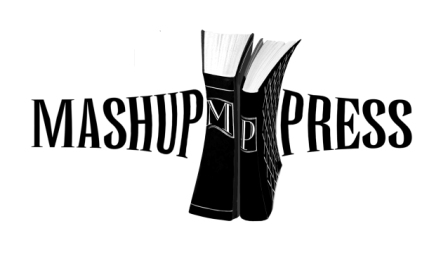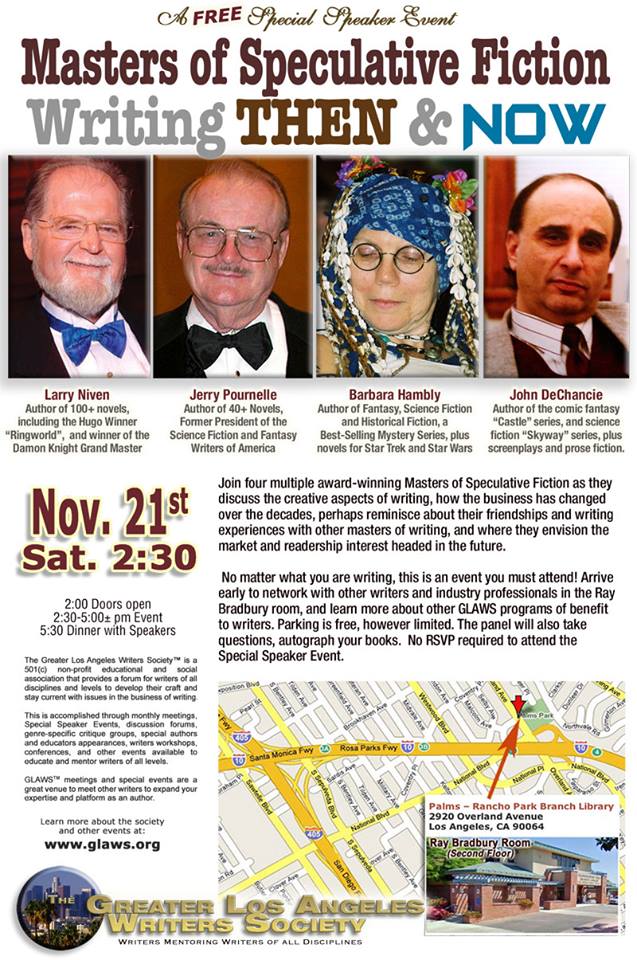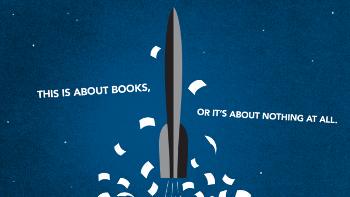It was a prolific day, with new posts from Sad Puppies’ Torgersen and Correia, and Rabid Puppies’ Vox Day, puppy supporters Dave Freer and Amanda S. Green, and detractors John Scalzi and David Gerrold. A host of new voices joined the exchange. And Adam-Troy Castro has penned something that is either a satire, or a candidate for the Sad Puppies 4 slate — decide for yourself.
Dave Freer on Mad Genius Club
“Battlers” – April 20
It’s been interesting to see how this has spun in the little circus that has been the Hugo Awards this year. The big guys, Nielsen Hayden, Stross, GRRM, Scalzi – you know wealthy, powerful white men who have won huge numbers of Hugo Nominations and indeed awards, are up in arms because some rag-tag bunch of uppity little battlers who’d never been there before, from across the social, political, racial and sexual spectrum got nominated, instead of a narrower group they approve of – including… just by chance, themselves and friends, many of whom who have multiple prior noms and awards. It’s taken away diversity and these nominees want women and ‘PoC’ (‘People of Color’ which bizarrely is not offensive, but ‘Colored People’ is just vile. It makes perfect sense, doesn’t it?) Of course these rich, powerful white men are feminists and oppose racism. Are they leading the charge because they think white men are just naturally better at it?
Look, all we’ve really got is making fun of the bastards. I feel kind of guilty sometimes because it is so easy, but hell’s teeth, they’ve brought enough weight to bear against us. I’m kind of losing count at the rent-a-hit journalism (a plainly very ethical field, full of honest honorable folk) informing us we’re all rich white men oppressing everyone and winding the clock back. Is it daylight savings over there already?
Still, I’m glad to be learning my place from David Gerrold. I’d never have guessed that I was one of the little people otherwise.
John Scalzi on Whatever
“Keeping Up With the Hugos” – April 20
At this point Correia and Torgersen have to decide whether they want to be known either as Day’s fellow travelers, or his useful idiots. Or both! It could be both. Neither of these options makes them look good; nor, obviously, fits with their own self-image of being Brave Men Fighting the Good Fight™. But in fact, they aren’t fighting a good fight, and in fact, they got played. So: Fellow travelers or useful idiots. These are the choices.
* Also, can we please now stop pretending that this whole Puppy nonsense began for any other reason than that once upon a time, Larry Correia thought he was going to win an award and was super pissed he didn’t, and decided that the reason he didn’t had to be a terrible, awful conspiracy against people just like him (a conservative! Writing “fun” fiction!), as opposed to, oh, the voters deciding they just plain liked something and someone else better?
…(And yes, I know, Correia declined his nomination for the Hugo this year. Let’s talk about that for a minute, shall we. It takes a very special sort of fellow to allow himself to be on a slate to get nominated, marshal people to nominate him for the award as part of a slate, and then decline — and write a big ol’ puffed-up piece about why he was declining, social justice warriors, blows against the empire, blah blah blah, yadda yadda. Yes, nice he declined the nomination and let someone else on the ballot. But it’s a little like wanting credit for rescuing a baby squirrel when you knocked the baby squirrel out of the tree to begin with.)
To be clear, the Puppy nonsense now isn’t just about Correia really really really wanting validation in the form of a rocketship; Day’s stealing the Puppy movement right out from under Correia and Torgerson has changed things up quite a bit, and it’s certainly true at this point that this little campaign is about a bunch of people trying to shit in the punchbowl so no one else can have any punch. But at the beginning, it was Correia hurt and angry that someone else got an award he thought was his, and deciding that it was stolen from him, rather than being something that was never his to begin with. And I’m sorry for him that it didn’t go his way. But actual grown human beings deal with disappointment in ways other than Correia has.
If the Hugos have really been dominated by leftist material that prized message over story since the mid-1990s (Brad’s timeline), it should be very simple for members of the Puppy Party to name
a. one work of fiction
b. that won a Hugo Award
c. while foregrounding a left message to the extent that the story was ruined or misshaped
d. per set of winners since 1995.
That’s all. Just a list of twenty books or stories—a single winner per year. Even though a single winner per year wouldn’t prove domination, I’m happy to make it easy for the Puppies.
Any Puppy Partisan want to start naming some names?
Brad R. Torgersen
“Nuking the Hugos from orbit” – April 20
The chief sin of Sad Puppies 3 seems to be that we were transparent and we were successful beyond all expectation.
Many a red herring has been lobbed at us over the past three weeks. All of these are colossal distractions from the central question I’ve been asking my entire (short, so far) career: do the Hugos even matter anymore, and if they don’t, how to we get them to matter again?
My logic has been: get more people to vote, and bring those people in from diverse sectors of the consumer market, and the cachet of the award increases because more and more people from a broader spectrum of the totality of fandom (small f) will have a stake in the award, pay attention to what’s selected for the final ballot, and will view the award as a valid marker of enjoyability; or at least notoriety.
Especially since the Hugos have already been subjected to numerous manipulations (again, all behind the scenes) by authors, voters, and publishers, who all seem to want the Hugo to better reflect their tastes, their interests, their politics, and their pet points they want to make with the award.
Brad R. Torgersen
“Ringing the bell” – April 20
Picking up where I left off with my post on tribalism. Because I wanted to talk specifically about a recurrent kind of “broken” I am seeing in arguments all over the place — beyond the tiny halls of the Peoples Republic of Science Fiction. This “broken” is most commonly manifested among well-meaning straight Caucasian folk, but is often fostered and preached about by non-straight and/or non-Caucasians of a particularly aggressive “progressive” persuasion.
Adam-Troy Castro on Facebook
The irrepressible ensign, whose blonde hair and pale complexion had put him on the fast track to command from the very first medical determination that he was not gay, reported, “It’s a SJW vessel, Captain. They’re demanding our surrender!”
Captain Christian White grimaced, heterosexually. He remembered the last time a Federation vessel had allowed an SJW cruiser its way, sashaying across the universe at multiple times the speed of light. The Federation’s resolve had weakened, the rockets had sagged a little on their pads, and one of the medals for valor that year had actually gone to somebody with a slightly ethnic last name. Only the keen perception of Captain White and his fellow cabal had recognized that this was the sign of a vile conspiracy, and allowed the institution of safeguards to make sure that this would never happen again.
Kevin Standlee
“Combatting Hugo Despair” – April 20
If you don’t clean up graffiti, it typically spreads.
- Cleaning up graffiti is hard work.
- It is easier, when you see graffiti defacing something nice, to say, “Oh, what a shame. I loved that once, but now it’s defaced, so I guess we’d better abandon it” than to break out the scrub brushes and solvent and to organize the community to help clean it up.
- Initially, when you clean up graffiti, it’s not unusual for the vandals to consider it a nice clean slate for their next attack.
- If you consistently clean up graffiti attacks, after a while the vandals discover that almost nobody ever sees their works of destruction, and eventually they will give up and go away because they stop getting any egoboo out of defacing things.
My position with the Hugo Awards, the World Science Fiction Convention, and the World Science Fiction Society? Well, I’m putting on my coveralls, buying some heavy duty scrub brushes, picking up the box of old rags, and rummaging around in the garage for that industrial-sized can of solvent I know we had in there somewhere.
David Gerrold on Facebook – April 18
Some draconian measures have been suggested. Those cures would be worse than the disease and would pretty much hand a victory to the self-appointed super-villain. He would have succeeded in destroying the award.
I think there’s a simpler solution. I’m tossing it out here for discussion. What if we gave the Worldcon committee the discretion to create a committee of qualified individuals who would review the nominating ballots and set aside any that show strong evidence of ballot stuffing? So if a hundred ballots come in and they are all identical — and if they all contain nominations for works or individuals that are not represented or significantly under-represented on any other ballots, then that can be seen as evidence of a ballot-stuffing effort and those ballots can be set aside.
This would not disqualify recommended reading lists. Those would still be encouraged.
Notice the separate components. The Worldcon committee themselves will not have the responsibility for adjudicating — instead, they have the option of creating an independent committee of qualified individuals, preferably past Worldcon committee members. Second, they cannot set aside ballots willy-nilly, only those that show evidence of a slate. If the slate-mongering has been a public effort, it’s an easier job. But if a hundred ballots come in all voting for the same stories and there are no other ballots that also include any of those stories, then that’s evidence of a ballot-stuffing campaign and the ballots should be set aside.
Had such a rule been in place this year, the entire rabid slate could have been nullified, while still allowing the majority of voters their rightful opportunities to be heard.
Rogers Cadenhead on Workbench
“Brad Torgersen’s ‘Science Fiction Civil War’” – April 20
There’s a lot about this situation that gets me all het up, but I’m beginning to savor the insane grandiosity of Torgersen (pictured above), a previously obscure SF/F author who led the bloc-voting campaign this year and dubbed it “Sad Puppies 3.”
On April 8, Torgersen wrote a blog post on his personal site called “The Science Fiction Civil War” that he later deleted.
Here’s the text of that post, which offers a fantastic glimpse into the preening self-regard that inspired him to lead a culture war against a much-loved SF/F award that fans of all political beliefs have nurtured since 1953….
John C. Wright
NPR Upholds Morlock Journalistic Ethics – April 20
Well, well. The NPR weekend show ON THE MEDIA has joined the lynch mob, and done their level best to add hysteria and contumely and smother any trace of rational dialog in the little sortie of the Culture Wars known as Sad Puppies.
They were paid for by my tax money, my dear readers, and yours.
And before you ask, no, no journalist, no editor, no one contacted me or interviewed me or made any attempt known to me to hear from the counsel for the defense. At a real witch trial held by the real Inquisition, even the devil gets an advocate and someone speaks up for defendant being accused of witchcraft.
Vox Day on Vox Popoli
“Puppies on NPR” – April 20
KW listened in and heard NPR doing their usual bang-up job on Sad Puppies. For me, the most intriguing aspect of the media coverage has been the near-complete lack of interest in actually talking to anyone involved in the actual news-making activity. I mean, I am about as cynical a media skeptic as it is possible to be, and yet somehow, these journalistic incompetents haven’t even managed to rise to my very, very low level of expectations.
Larry Correia on Monster Hunter International
“Catching up, then back to work” – April 20
Apparently there were a bunch more stupid articles and news reports this weekend, still running with the angry straight white men, anti-diversity slate angle. I don’t even bother reading them anymore. It is all the same script. I didn’t even know Popular Science was still around.
In the interest of full disclosure, none of the hit pieces tried to talk to us, but NPR’s On The Media did try to reach out. They sent me an email, they wanted to speak on the phone to gather info, but it was on a day when I was running around the wilds of Yard Moose Mountain and I missed their call. I sent them an apology the next morning.
I haven’t listened, but I heard they brought in professional outrage monger Arthur Chu to explain everything. Ha! But to be fair, they at least tried.
Vox Day on Vox Popoli
“Black Gate withdraws” – April 20
Or rather, they have asked to not be considered for the Hugo award for which they will be on the ballot. While I disagree with John’s decision, I respect his right to make it. I find it ironic, however, that people are responding to a large group of people dictating the ballot by unilaterally dictating to people for whom they will not vote.
I also find it telling that a threat to support No Award next year is supposedly worse than a vow to do it this year. I am curious. Would they consider it better if I accepted what passes for their reasoning and announced that Rabid Puppies will join the No Award movement this year? Because that is certainly an option. (Settle down, you bloodthirsty bastards, I said no more than the obvious. It is an option.)
The goal is to improve the Awards, not destroy them. But if the SJWs would rather destroy them than relinquish their control, well, that will tell the world exactly what sort of totalitarians they are. That’s two birds for the price of one. We’ve already got them on the record stating that our views are invalid and should be suppressed by force; seeing them demolish the awards without our assistance will communicate that more effectively than we can do ourselves.
Joe Sherry on Adventures in Reading
Hugo News: Black Gate Edition – April 20
What I am most curious about here is that because the ballots are already at the printer, Sasquan is unable to remove Black Gate from the ballot (apparently some people still use paper ballots – because science fiction is a genre of the future…) – but will Black Gate’s request be honored? Will votes for Black Gate just not be counted? This might be the easiest solution.
Lou Antonelli on Facebook – April 20
Got my annual Mensa membership card in the mail today. I’m not showing this out of vanity, it’s just I’ve found it’s a good idea to keep it handy because the first slur the Anti-Puppy snobs usually toss out when disrespecting you is “stupid”.
Amanda S. Green on Nocturnal Lives
“No winners?” – April 20
And that is the problem. They are making Vox the issue and are, in all too many instances, refusing to even consider a nominee he might have liked or recommended. That is, as I have said before, a disservice to all those authors and artists who have done good work, worthy work.
Look, here’s the truth of the matter. Vox is but one man. Yes, he might say things that make us uncomfortable. He might believe things that seem further out than left field. But, as writers and artists, we have no control over who reads/sees or likes our work. If you don’t like Vox and can’t bring yourself to read his work, that’s fine. But don’t condemn others who have no relationship to him except for the fact he nominated them. (Full disclosure here, I was one both SP3 and Rabid Puppies. I didn’t realize I was on Rabid Puppies until well after the nominees were announced.)
Doctor Science on Obsidian Wings
“Vox Day is exploiting the Sad Puppies for personal gain” – April 20
I don’t know the details of the rules, but I figure this is probably enough evidence for Sasquan’s Hugo Awards Committee to decide that Castalia House engaged in illegal ballot-stuffing under the current rules, and to remove all Castalia House-associated nominees from the Hugo Ballot. If it’s an option, I’d suggest that Vox Day and Castalia House be considered ineligible for nomination for at least a few years going forward, too.
Rjurik Davidson on Overland
“The Mad Puppies revenge” – April 21
How do we best understand this culture war? The immediate cause, it seems, is the fact that in recent years, the Hugo Awards have been transformed. In other words, there has been a slow, molecular, and very incomplete growth of progressive values within science fiction and fantasy, along with the concomitant breaking down of established racist, homophobic and patriarchal barriers. The number of women nominees, for example, reached rough parity between 2011-2013. In this way, again, it parallels the Gamergate controversy: games having been once the protected turf of white males.
https://twitter.com/johnmarkley/status/590293279545110529
Jon F. Zeigler on Sharrukin’s Palace
“My first (and last) word on the Hugos” – April 20
[Here is the most novel approach to the voting process I have read (no pun intended.) (Well, maybe a little intended.) The decision to use a concrete example as a reference point sets Zeigler apart from most in the “I know quality when I see it” camp. And it is also a solution that is not obviously driven by an agenda. Very interesting idea:]
In each category, in so far as I am able and with only one general exception, I plan to examine all the works on the ballot and give them fair consideration. I will rank them in order of their quality, using my own tastes and criteria. So far I doubt I’m planning to do anything unusual.
Where my strategy may be distinctive is that I plan to examine six items for each category – the five on the ballot, and the item that I consider to have been the best eligible work that did not reach the ballot.
So for example, in the Best Novel category this year, on the final ballot we have:
- Ancillary Sword by Ann Leckie
- The Dark Between the Stars by Kevin J. Anderson
- The Goblin Emperor by Katherine Addison
- Skin Game by Jim Butcher
- The Three Body Problem by Cixin Liu, translated by Ken Liu
I know some of those works got onto the ballot because of slate voting and some did not. At least one novel, in fact, was added to the ballot only after an author whose novel was on one of the slates withdrew it from consideration. I’m not going to take any of that into account. As much as I disapprove of organized slates, it’s still possible that a slate might have selected the best available work.
On the other hand, it’s also possible – even likely – that a slate will actually push some of the best available works out of consideration. In fact, the people organizing this year’s slates allege that this has already been happening for a long time – that other parties have (informally) manipulated the nominations process to exclude otherwise deserving work.
All right, so let me correct for that possibility. That’s where the sixth work under consideration in each category comes in. I’ll read and evaluate that work too, but it will hold the slot for No Award in its category. Thus, if I find that a work on the ballot is markedly inferior to the one that did not get nominated, I will have to assume that something went wrong. Either my tastes are really unusual, or some form of manipulation of the nominations process pushed the more deserving work off the ballot. In either case, I’ve identified a work that will rank below No Award in my selection.
To return to my example, the sixth work I’ll include in my decision-making process will probably be Echopraxia, by Peter Watts. I read that novel a couple of months ago, and it quite impressed me at the time. So any novel that I find is at least comparable in quality to Echopraxia will get ranked above No Award on my ballot. Any novel that I find is clearly not comparable will get ranked below No Award.
https://twitter.com/deirdresm/status/590345129199730689
Mark Ciocco on Kaedrin weblog
“The Three-Body Problem” – April 19
However, since this year’s Hugo awards are so weirdly contentious, one of the Best Novel nominees dropped out of the race. I’m not sure if this is unprecedented or not, but it’s highly unlikely nonetheless (authors often refuse their nomination, but are given a chance to do so before the finalists are announced – this situation where an author sees the lay of the year’s Hugo land and simply opts out was surprising) and many were expecting this to mean that the Best Novel category would only include 4 nominees. After all, adding the next most popular nominee would tell everyone who got the least nominating votes (info that is only published after the awards are handed out) and honestly, given the current situation, this precedent seems ripe for abuse. Nevertheless, the Hugo administrators opted to fill the open slot with The Three-Body Problem (a non-Puppy nominee, though from what I’ve seen, the Puppies seem to really enjoy this book). From left off the ballot to potential winner, quite a turn of events. Of the two nominees I’ve read, this is clearly ahead and could possibly take my number 1 vote. It is a bit of an odd duck, but I quite enjoyed it.
John C. Wright
“Not so much Dino-hate, Please!” – April 20
At the risk of alienated my beloved fans who voted either for Sad Puppies or Rabid and elevated my humble work to a world-record number of nominations, I would like to state something for the record.
A lot of us are ragging on Rachel Swirsky’s prose poem ‘If You Were a Dinosaur, My Love‘ which was Hugo nominated and won a Nebula for its category.
And, for the record, I for one do not think ‘If You Were a Dinosaur’ is bad. I do not think it is great, but tastes differ.
The author with admirable brevity of space establishes a gay and playful mood, using a stream of consciousness technique and adhere to a strict textual scheme (lifted from IF YOU GIVE A MOUSE A COOKIE) and then fishtailing into a surprise ending that is poignant and moving, all within less than 1000 words.
Stevie Carroll in Women & Words
“This Year’s Hugo Awards, Diversity in SF and Fantasy, and the Bechdel Test” – April 20
Diversity in SF and Fantasy has been a major discussion topic at both the conventions I’ve been to this year as well as on a lot of author blogs in the genre that I follow (most of which fall into a group of bloggers that the anti-feminist, anti-diversity complainers derisively refer to as Social Justice Warriors because they’re somehow offended by the idea that straight white men might actually support feminism and other forms of equality campaigning). I think two of my favourite comments came from a discussion panel on Dr Who – one from a white woman who described her feelings of alienation when she moved in the 1980s (IIRC) from a typical inner city in the UK to Cambridge where the population was far less diverse than she was used to, and the other from an audience member who asserted that these days if the Doctor is to be invisible (in the sense of generally ignored by those around him) in a lot of places then he could do worse than being either a young black man or a woman in her fifties or older.
William Reichard on Plaeroma
“RE: Update on sci-fi & the ‘Hugo Maneuver’” – April 20
Just a quick update to let everybody know our plan is working better than we could have anticipated. “Debate” on the subject of the Hugo Awards has become a self-perpetuating firestorm that shows no signs of lessening. Writers on all sides of the issue are fully engulfed, and the conflagration even shows promising signs of spreading to the larger culture.
Rest assured, any dangerous minds on all sides will be doing nothing else of significance for months if not years thanks to this coup, and thus we are safe to continue our diabolical work with impunity for now as the discussion descends into ever more atomic and arcane levels.
Wikipedia adds section to entry for “Theodore Beale” – April 20
2015 Hugo Awards
In 2015 Beale’s slate of candidates for the Hugo Awards, which placed most of its nominees on the ballot, led two authors to withdraw their own nominations, and for one presenter to withdraw from the event.





